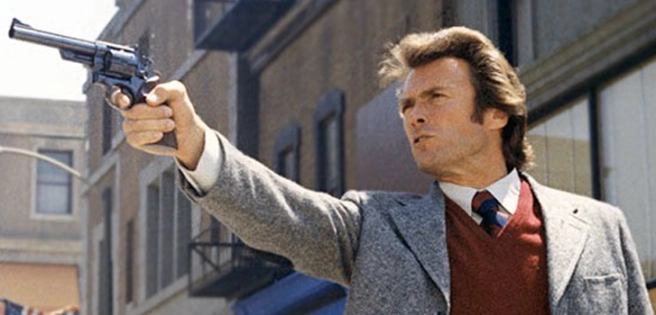Directed by Don Siegel

Dirty Harry feels like a dose of old-school cowboy badassery, at the time polite racism, the Zodiac killer, the terminator and a ‘fight the power’ mentality wrapped up in a man who looks like he voted for Richard Nixon, twice.
Inspector Harry Callahan (Clint Eastwood) is mean, focused, silent, brooding and a defender of victim’s rights, particularly when the law isn’t enough. He’s also very bold, willing to pull out his gun in the middle of a crowded intersection in broad daylight even before it’s clear that what he’s about to do requires a firearm.
Structurally, this film is a bit odd but it still follows a basic three act structure. The very first thing we are introduced to is not our protagonist, but the antagonist, a gunman who has an affinity for sniping his victims. Once he kills his first victim, he leaves behind a note declaring that he will kill one person a day until he’s given $100,000.
The first reaction by the police is to find him rather than to negotiate with him, though some higher ups show an inclination towards the possibility of negotiating. Dirty Harry, however, would never indulge such a mad man’s demands.
The gunman is identified on a rooftop by a chopper, but he somehow escapes. That night, Harry and his new partner, Chico (Reni Santoni), find the gunman hurrying through a street. They quickly lose him, and Harry is beaten up by a few guys who see him peeking into a woman’s house. Harry does some weird stuff like this. He doesn’t seem to spy on this woman because it has anything to do with the case. He’s just… interested. It’s not even sexual.
Later he will notice a naked woman (through his binoculars), and he spends time staring at her before the plot pulls him away. He’s not apologetic in any way, whether for his casual racism, his frustrations towards the law which he’s sworn to defend or for his male gaze.
These moments don’t seem to contribute to the plot in any way, just like another set of scenes that demonstrate Harry’s character and skill but don’t move the story forward. You have, first, the famous “You gotta ask yourself, ‘do I feel lucky?'” scene in which Harry stops a robbery, and then you have another scene in which he prevents a man from jumping to his death off the ledge of a building. These are just instances of Harry doing his job, though in his own way. He tells his new partner that he got his nickname because he has to do all the dirty work of the police.
Well, act 1 ends when Harry and Chico spot the gunman on a neighboring roof and exchange gun fire with him. The gunman gets away. He is pissed, first that the police lied to him about getting him the money (though he seemed to know that was a lie from the beginning) and second, that the police fought back.
The gunman ups the stakes by now demanding $200,000 and giving the police clues that he kidnapped a young girl and has her buried somewhere with enough oxygen to last a certain number of hours. The police give Harry the money and send him out to give it to the gunman who then send Harry on a wild goose chase, ending at a giant cross in San Francisco’s under-appreciated Mt. Davidson park (seriously, it’s beautiful there).
Harry is nearly killed, but Chico intervenes. After the scuffle, Chico is shot and the gunman is shot and stabbed, but he gets away.
Harry later tracks down the gunman to where he lives in a sort of utility closet at Kezar Stadium. He again shoots the gunman and arrests him. Act 3 begins when Harry learns that the gunman will walk away with no charges against him because Harry went outside the law to catch him (unlawfully breaking into the man’s home).
Pissed, Harry spends his time off work following the injured gunman as he hobbles around the city. To get Harry off his back, the gunman pays a man to beat him up so he can claim it was Harry and the police who did it. Later, the gunman hijacks a school bus and makes more demands. He drives north over the Golden Gate Bridge and into Sausalito.
The police tell Harry to deliver the money, but he’s already tried that so he’s tired of being their errand boy. He tells them to find someone else. We follow the gunman as he begins to unravel. He first leads the kids in song, but soon he’s hitting kids and taking the wheel himself, knocking the bus driver aside. In the most kick ass moment of the film, the gunman panics when he sees the terminator, I mean Harry, standing menacingly on top of railroad tracks over the road. He jumps onto the bus, and a chase ensues that ends with Harry killing the man, repeating the same speech “Do ya punk? Do ya?” that he gave to the robber earlier in the film.
Harry looks at his police badge and throws it away. The message is clear: sometimes the law isn’t enough.

You’re an idiot. Dirty Harry was made in an era when there was a crying need for justice for victims of violent crimes. It made Clint Eastwood a superstar, duh!!! To theorize what the reaction today would be to Dirty Harry is ridiculous. Clint Eastwood was a man’s man in 1971. Every man wanted to be him and every woman wanted to be with him. He’s the last of the truly great Hollywood icons. Here’s a clue: It’s a movie, deal with it!!!!!! Go get a real job and stop pretending to be whatever you think you are.
LikeLike